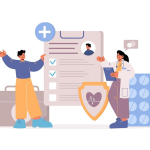
ISO Standards For Health And Safety: Ensuring Worldwide Quality Care
ISO, the International Organization for Standardization, develops and publishes international standards that ensure access to quality healthcare, safe medical practices, and cost-effective solutions. These standards are essential for maintaining high levels of quality and consistency across the global healthcare sector.
ISO guidelines help healthcare providers deliver better patient outcomes, enhance operational efficiency, and meet regulatory requirements. This content explores the importance of ISO standards in healthcare, covering their benefits, key areas of application, and support for global health goals.
Role Of ISO In Healthcare
ISO plays a crucial role in healthcare by setting standards that enhance quality and efficiency across various medical services:
ISO’s Global Network
ISO operates through a network of national standards bodies, providing a global platform for developing practical tools through common understanding and cooperation. With members in 164 countries, ISO is a significant player in creating international standards that impact various industries, including healthcare.
Alignment With UN Sustainable Development Goals
ISO standards support the United Nations Sustainable Development Goals (SDGs), particularly the goal of good health and well-being. By implementing ISO standards, healthcare organizations contribute to improving global health outcomes and ensuring access to quality care for all.
Key Areas Covered By ISO Health Standards
ISO Health standards cover many key areas to enhance safety and efficiency in healthcare such as:
1. Quality Management And Risk Management
ISO standards for quality management and risk management ensure the safety and effectiveness of health practices and products. Notable committees include:
- ISO/TC 210: Focuses on quality management for medical devices.
- ISO/TC 212: Covers clinical laboratory testing and in vitro diagnostic test systems.
2. Medical Devices
ISO develops standards for the evaluation and safety of medical devices, ensuring they meet rigorous quality and safety requirements before commercial use. Key committees include:
- ISO/TC 194: Standardizes biological and clinical evaluation of medical devices.
- ISO/TC 198: Lays down requirements for the sterilization of healthcare products.
3. Health Informatics
The standardization of health informatics by ISO facilitates efficient data collation and sharing, ensuring compatibility and interoperability between health systems.
- ISO/TC 215: Strives to achieve interoperability in the use of health-related data.
Benefits Of ISO Health Standards
The benefits of adhering to ISO health standards in healthcare are manifold, driving better practices and outcomes:
1. Ensuring Quality And Safety
ISO health standards ensure that healthcare practices and products are safe, reliable, and effective. They provide a framework for quality management and risk assessment, helping organizations maintain high standards of care.
2. Supporting Regulatory Compliance
ISO standards offer a solid technical base for health legislation, helping regulators develop market-friendly regulations that meet public expectations. They provide consistent guidelines, reducing the need for multiple specifications and lowering compliance costs.
3. Promoting Innovation And Efficiency
ISO covers emerging technologies in healthcare, such as optics and photonics, integrating innovative solutions into healthcare practices. These standards help businesses gain a competitive edge by ensuring their products and services are safe and trustworthy.
Specific Health Sectors Addressed By ISO Health Standards
ISO standards extend to various health sectors, ensuring high standards and efficiency in diverse health sectors. Here the some healthcare fields:
1. Dentistry And Surgical Implants
ISO standards cover dental materials, instruments, and equipment, as well as surgical implants. Key committees include:
- ISO/TC 106: Focuses on dentistry.
- ISO/TC 150: Sets specifications for surgical implants.
2. Healthcare Organization Management
ISO standards for healthcare organization management cover non-clinical operations, including facility management, staff coordination, and patient services.
- ISO/TC 304: Develops standards for healthcare management practices.
3. E-Health Technologies
ISO’s work in health informatics ensures that health data can be efficiently shared and managed across different systems, supporting the digital transformation of healthcare services.
Conclusion
ISO standards are vital in ensuring the quality, safety, and efficiency of healthcare services worldwide. By adhering to these standards, healthcare organizations demonstrate their commitment to high-quality care, transparency, and patient safety. ISO’s extensive work across various health sectors helps harmonize practices, reduce costs, and promote innovation, ultimately contributing to better health outcomes globally.
Frequently Asked Questions (FAQs)
What Is The Purpose Of ISO In Healthcare?
ISO develops international standards to ensure quality, safety, and efficiency in healthcare, benefiting patients, providers, and regulators worldwide.
How Do ISO Standards Support Global Health Goals?
ISO standards align with the UN Sustainable Development Goals, particularly promoting good health and well-being by ensuring access to quality care and safe medical practices.
Which Areas Of Healthcare Are Covered By Iso Standards?
ISO standards cover a wide range of healthcare sectors, including medical devices, dental care, health informatics, surgery, and healthcare organization management.
How Do ISO Standards Benefit Healthcare Providers?
Healthcare providers benefit from ISO standards through consistent guidelines, reduced compliance costs, and enhanced quality and safety of care.
Why Is Stakeholder Collaboration Important In Iso Standard Development?
Stakeholder collaboration ensures that ISO standards are practical, widely accepted, and meet the diverse needs of global healthcare sectors.
Download official PDF ISO Standards For Health From Here
Enhance Patient Care and NABH Compliance with LazyMonkey
LazyMonkey is your all-in-one solution for improving patient care, retaining more patients, and meeting NABH standards. Our powerful QR-based feedback tool enables you to capture real-time insights from patient feedback, discharge surveys, staff and doctor evaluations, and clinical research, while also streamlining inter-departmental communication.
Transform your healthcare facility today - reach out to us at hello@lazymonkey.in, or request a demo here!
Elevate Your Restaurant Experience with LazyMonkey
LazyMonkey’s QR-based feedback system helps you gather real-time insights from customers, track satisfaction levels, and enhance the dining experience. Get instant feedback on your menu, service, and ambience, and make data-driven improvements to boost repeat customers and reviews.
Improve your restaurant today – reach out to us at hello@lazymonkey.in, or request a demo here!
Empower Student Engagement and Campus Improvement with LazyMonkey
LazyMonkey offers a seamless way to gather student feedback, track satisfaction, and enhance campus life. From course evaluations to dorm feedback, our QR-based solution makes it easy to capture valuable insights and improve student retention.
Upgrade your university experience – contact us at hello@lazymonkey.in, or request a demo here!
Streamline Feedback and Drive Performance Across Your Enterprise/Franchise with LazyMonkey
Whether you manage one or multiple locations, LazyMonkey’s QR-based feedback system helps you gather real-time employee and customer feedback. Improve operational efficiency, track satisfaction, and make data-driven decisions to enhance brand consistency and growth.
Transform your franchise today – reach out to us at hello@lazymonkey.in, or request a demo here!
Enhance Customer Satisfaction and Service Standards in Banking with LazyMonkey
LazyMonkey empowers banks to capture real-time feedback from clients across branches. Improve customer experience, assess service quality, and ensure regulatory compliance with our QR-based solution, helping you retain clients and meet banking standards.
Elevate your bank’s customer care – contact us at hello@lazymonkey.in, or request a demo here!
Boost Customer Engagement and Mall Satisfaction with LazyMonkey
LazyMonkey’s QR-based feedback tool enables you to collect feedback from shoppers, track satisfaction, and enhance the mall experience. Gather insights on store services, cleanliness, and entertainment to create an unmatched customer journey.














